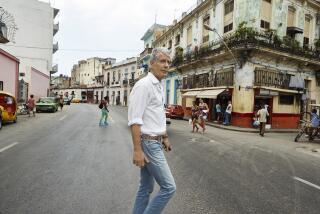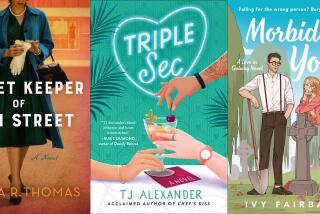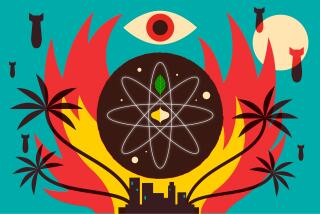LEIMERT PARK : Gang Truce Inspires Poetry Festival
Merilene Murphy said she was inspired to organize a poetry festival by something that would seem anything but poetic: the truce last year between the city’s rival Crips and Bloods gangs.
But “Peace L.A.: The Poetics of Gang Truce,” which took place last Sunday in Leimert Park, also addressed the social discontent underlying much of the violence that still plagues the city: lack of jobs, inadequate education, frustration with the political system.
“This was a community-healing dialogue,” said Murphy, a 38-year-old transplanted New Yorker who has read throughout Los Angeles for four years. “People are saying: ‘It’s time. We’re sick of it. We’ve been at war too long.’ We need to come in with positive vibrations.”
Murphy staged the event with a $3,000 grant from the city’s Cultural Affairs Department. In addition to poetry, the block party featured art and writing activities, screenings of films, spoken-word performances, and West African drumming and dancing by Le Ballet de Kouman Kele.
Readings by Murphy and eight other poets were beamed live by videophone to a back-yard barbecue in Boston and to Redding, Pa., with performances and discussions by poets in those cities beamed back to Leimert Park.
Members of Hands Across Watts and Good News, two grass-roots groups founded last year to facilitate peace among gangs, also spoke to the roughly 100 people who attended.
“Poetry is my way of getting something going, bridging a gap,” said Murphy. “The gang truce document is far-reaching. It’s a working piece of art we can act on, help make real. This is a celebration of peace, not war.”
The poets, including Houston Blue, Michael Lally and Kamauu Daa’ood, were joined at the event by five panelists who work with gang members in some way--people who are “stealing our children back from the mean streets on a daily basis,” Murphy said.
Poet and panelist Kambon Obayani, 40, a former gang member from Venice, said he was fortunate to develop a creative outlet.
“A lot of these guys in the street are creative but are not functioning in a set structure. . . . At some point they have to realize, like I did, that there’s something else out there,” said Obayani, a literature professor at Pierce College who works with gang members through a city arts program.
Murphy said that in inviting poets of various ethnic backgrounds to address potentially explosive subjects in an area of the city that suffered much in last year’s riots, she may have been “stacking the deck.”
“Sure, there’s a diversity in our looks and our styles,” Murphy said. “So what? We can’t live in fear anymore.”
More to Read
Sign up for our Book Club newsletter
Get the latest news, events and more from the Los Angeles Times Book Club, and help us get L.A. reading and talking.
You may occasionally receive promotional content from the Los Angeles Times.






